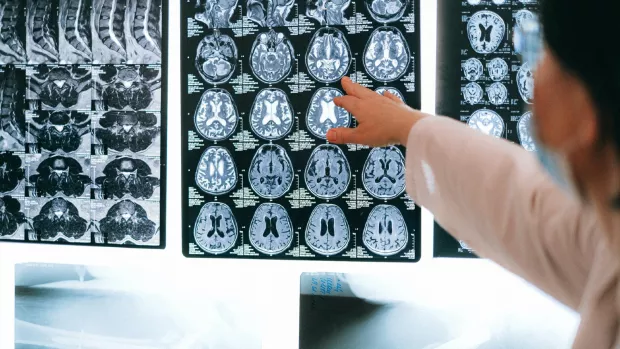
New research suggests self-reported information could help predict MS progression
A new study from the UK MS Register investigated how we can use information provided directly by people with MS to look at MS progression.
Patient-reported outcomes (PROs) are pieces of information someone gives about their own health through questionnaires. For example, information about their symptoms, like mobility.
In a new study from Imperial College London and Swansea University, researchers used PROs about physical disability, recorded in the UK MS Register, to look at how MS progresses.
What did they find?
People who reported more severe physical disability within five years of diagnosis with relapsing MS, were more likely to go on to be diagnosed with progressive MS.
Using just these self-reported PROs, the researchers could see more advanced disability years before participants had a clinical diagnosis with progressive MS. So, the level of disability around the time of diagnosis could be an indicator of how people’s condition will progress.
What does this mean for people with MS?
This new research highlights how registries like the UK MS Register could help people with MS in the future. Self-reported information from people with MS has the potential to be used to make predictions about how someone’s MS might progress. So, in the future, the right treatments could be chosen early on based on PROs like the ones used in this research.
Using self-reported information in this way could be convenient for people with MS because they could submit the data online when it suits them. But we need to do more research to see if it’s possible and test how it could be done.
Our Research and Communications Manager, Dr. Catherine Godbold, says:
"These results suggest information provided by people with MS themselves about their physical symptoms, could have the potential to predict how their condition may worsen in the future. Being able to predict MS progression, could help people make more informed decisions about their care and give them more clarity about the future."
What did the researchers do?
The researchers looked at UK MS Register data of 15,976 people with MS over an 11-year period. Each participant answered questionnaires about how well they can walk and move – these are the PROs they used.
The researchers also looked at things like type of MS and how long someone’s had MS for.
The benefit of using registries, like the UK MS Register, is that they collect both PROs and clinical and NHS data over several years. So we can collect ‘real-life’ data directly from people with MS. And we can do this cost-effectively and over a long time period.
What’s next?
More research is needed to be sure if and how we may be able to use these PROs to predict how someone’s MS will progress.
Researchers now want to investigate how other PROs are connected to early disability by using information based on different questionnaires. For example, PROs related to someone’s mood or sleep.




